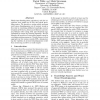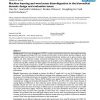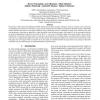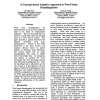18 search results - page 1 / 4 » Combined One Sense Disambiguation of Abbreviations |
ACL
2008
13 years 6 months ago
2008
A process that attempts to solve abbreviation ambiguity is presented. Various contextrelated features and statistical features have been explored. Almost all features are domain i...
ACL
1998
13 years 6 months ago
1998
Word sense disambiguation algorithms, with few exceptions, have made use of only one lexical knowledge source. We describe a system which t)erforms word sense disambiguation on al...
BMCBI
2006
13 years 4 months ago
2006
Background: Word sense disambiguation (WSD) is critical in the biomedical domain for improving the precision of natural language processing (NLP), text mining, and information ret...
LREC
2010
13 years 6 months ago
2010
We propose a Word Sense Disambiguation (WSD) method that accurately classifies ambiguous words to concepts in the Associative Concept Dictionary (ACD) even when the test corpus an...
ACL
1998
13 years 6 months ago
1998
Word sense disambiguation for unrestricted text is one of the most difficult tasks in the fields of computational linguistics. The crux of the problem is to discover a model that ...




